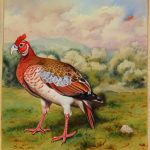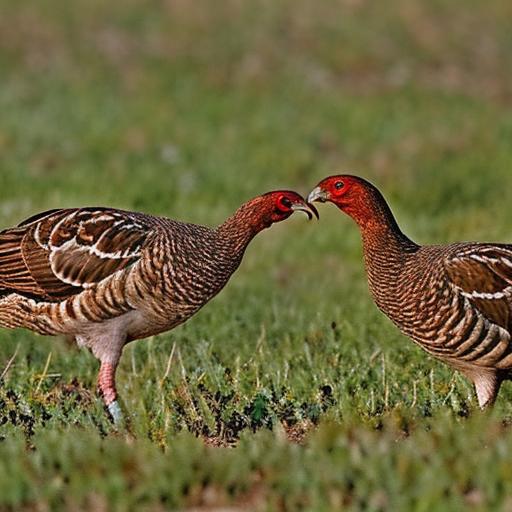Turkey breeding is an important aspect of the poultry industry, providing a valuable source of meat for consumers around the world. Breeding turkeys requires careful management and attention to various factors, including weather conditions. The success of turkey breeding is heavily influenced by the weather, as it can impact the health and productivity of the birds. Understanding the effects of weather on turkey breeding is crucial for farmers and breeders to ensure the well-being and growth of their flocks.
Turkey breeding involves the careful selection and mating of birds to produce offspring with desirable traits, such as size, meat quality, and disease resistance. The process requires a combination of genetics, nutrition, and environmental management to ensure the health and productivity of the birds. Weather conditions play a significant role in turkey breeding, as they can affect the birds’ health, behavior, and reproductive performance. Extreme temperatures, precipitation, and other weather-related factors can impact the overall success of turkey breeding operations. Therefore, it is essential for farmers and breeders to understand the impact of weather on turkey breeding and implement strategies to mitigate its effects.
Key Takeaways
- Turkey breeding is an important aspect of the poultry industry, with weather playing a significant role in its success.
- Weather conditions such as temperature, humidity, and precipitation can have a direct impact on turkey breeding.
- Strategies for managing weather effects on turkey breeding include providing proper ventilation, shade, and water sources.
- Temperature plays a crucial role in turkey breeding, as extreme heat or cold can negatively affect the birds’ health and reproduction.
- Precipitation, such as heavy rain or snow, can also impact turkey breeding by causing stress and affecting the birds’ access to food and water.
The Impact of Weather on Turkey Breeding
Weather has a significant impact on turkey breeding, influencing various aspects of the birds’ health and productivity. Extreme temperatures, whether hot or cold, can stress the birds and affect their growth and reproductive performance. High temperatures can lead to heat stress in turkeys, causing reduced feed intake, decreased egg production, and poor egg quality. On the other hand, cold temperatures can also impact turkey breeding by increasing energy requirements for maintaining body temperature, which can reduce feed efficiency and growth rates in the birds.
In addition to temperature, precipitation can also impact turkey breeding. Excessive rainfall can lead to wet and muddy conditions in the turkey pens, increasing the risk of disease and foot problems in the birds. Wet conditions can also affect the quality of the litter in the pens, leading to ammonia buildup and respiratory issues in the turkeys. Furthermore, extreme weather events such as storms and hurricanes can cause physical damage to turkey facilities, leading to disruptions in breeding operations. Overall, weather conditions have a direct impact on the health and productivity of turkeys, making it essential for farmers and breeders to manage these effects effectively.
Weather Conditions That Affect Turkey Breeding
Several weather conditions can affect turkey breeding, including temperature, precipitation, humidity, and wind. Temperature plays a crucial role in turkey breeding, as both extreme heat and cold can impact the birds’ health and reproductive performance. High temperatures can lead to heat stress in turkeys, causing reduced feed intake, decreased egg production, and poor egg quality. On the other hand, cold temperatures can increase energy requirements for maintaining body temperature, leading to reduced feed efficiency and growth rates in the birds.
Precipitation is another important weather factor that can affect turkey breeding. Excessive rainfall can create wet and muddy conditions in the turkey pens, increasing the risk of disease and foot problems in the birds. Wet conditions can also impact the quality of the litter in the pens, leading to ammonia buildup and respiratory issues in the turkeys. Humidity is also a critical factor in turkey breeding, as high humidity levels can contribute to heat stress in the birds, while low humidity levels can lead to dry conditions that affect respiratory health. Additionally, wind can impact turkey breeding by causing drafts in the turkey facilities, leading to temperature fluctuations and stress in the birds.
Strategies for Managing Weather Effects on Turkey Breeding
Managing the effects of weather on turkey breeding requires careful planning and implementation of strategies to mitigate its impact on the birds’ health and productivity. One effective strategy is to provide proper ventilation in turkey facilities to regulate temperature and humidity levels. Good ventilation helps to remove excess heat and moisture from the pens, creating a comfortable environment for the birds. Additionally, providing adequate insulation in turkey facilities can help maintain optimal temperatures during extreme weather conditions, reducing stress on the birds.
Another important strategy for managing weather effects on turkey breeding is to implement proper drainage systems to prevent water accumulation in the pens during periods of heavy rainfall. Good drainage helps to maintain dry and clean conditions in the pens, reducing the risk of disease and foot problems in the turkeys. Furthermore, farmers and breeders can utilize weather forecasting tools to anticipate extreme weather events and take preventive measures to protect their turkey facilities. By staying informed about upcoming weather conditions, farmers can make informed decisions to safeguard their flocks from potential harm.
The Role of Temperature in Turkey Breeding
Temperature plays a crucial role in turkey breeding, as it directly impacts the birds’ health, behavior, and reproductive performance. Extreme temperatures, whether hot or cold, can stress the birds and affect their growth and productivity. High temperatures can lead to heat stress in turkeys, causing reduced feed intake, decreased egg production, and poor egg quality. Heat stress can also lead to increased mortality rates in turkeys, particularly in young or older birds. On the other hand, cold temperatures can increase energy requirements for maintaining body temperature, leading to reduced feed efficiency and growth rates in the birds.
To manage the effects of temperature on turkey breeding, farmers and breeders can implement various strategies to regulate temperature levels in turkey facilities. Providing proper ventilation is essential for removing excess heat and moisture from the pens, creating a comfortable environment for the birds. Additionally, utilizing cooling systems such as fans or misters can help lower temperatures during hot weather conditions, reducing heat stress in the turkeys. In colder climates, farmers can provide adequate insulation in turkey facilities to maintain optimal temperatures and reduce energy requirements for the birds.
The Influence of Precipitation on Turkey Breeding

Precipitation has a significant influence on turkey breeding, as excessive rainfall can create wet and muddy conditions in the turkey pens, impacting the health and productivity of the birds. Wet conditions increase the risk of disease and foot problems in turkeys, leading to decreased growth rates and reproductive performance. Additionally, excessive rainfall can affect the quality of the litter in the pens, leading to ammonia buildup and respiratory issues in the turkeys. To manage the effects of precipitation on turkey breeding, farmers and breeders can implement strategies to maintain dry and clean conditions in the pens.
One effective strategy is to implement proper drainage systems to prevent water accumulation in the pens during periods of heavy rainfall. Good drainage helps to remove excess water from the pens, maintaining dry conditions for the birds. Additionally, farmers can utilize bedding materials such as straw or wood shavings to absorb moisture and maintain clean litter in the pens. Furthermore, providing elevated platforms or roosts for turkeys can help keep them off wet ground during rainy periods, reducing the risk of foot problems and disease.
Conclusion and Recommendations for Turkey Breeding in Different Weather Conditions
In conclusion, weather conditions have a significant impact on turkey breeding, influencing various aspects of the birds’ health and productivity. Extreme temperatures, precipitation, humidity, and wind can all affect the well-being of turkeys and their reproductive performance. To manage these effects effectively, farmers and breeders should implement strategies such as proper ventilation, insulation, drainage systems, and weather forecasting tools to mitigate potential harm to their flocks.
In different weather conditions, it is essential for farmers and breeders to adapt their management practices to ensure the health and productivity of their turkeys. During hot weather conditions, providing cooling systems and proper ventilation is crucial for reducing heat stress in turkeys. In colder climates, adequate insulation and shelter are necessary to maintain optimal temperatures for the birds. Additionally, managing precipitation effects by implementing proper drainage systems and maintaining clean litter in turkey pens is essential for preventing disease and foot problems in wet conditions.
Overall, understanding the impact of weather on turkey breeding is crucial for successful poultry production. By implementing effective management strategies tailored to different weather conditions, farmers and breeders can ensure the well-being and growth of their turkey flocks while maintaining high productivity levels.
When it comes to turkey breeding, weather can play a significant role in the success of the process. Factors such as temperature, humidity, and seasonal changes can impact the breeding behavior and reproductive success of turkeys. Understanding how weather affects turkey breeding can help poultry farmers optimize their breeding practices and improve overall productivity. For more insights on creating optimal breeding conditions for poultry, check out this informative article on chicken coop nest box design, which discusses the importance of providing comfortable and suitable nesting spaces for poultry.
FAQs
What is the impact of weather on turkey breeding?
Weather can have a significant impact on turkey breeding. Extreme temperatures, heavy rainfall, and high humidity can all affect the reproductive success of turkeys.
How does extreme temperatures affect turkey breeding?
Extreme temperatures, both hot and cold, can negatively impact turkey breeding. High temperatures can lead to heat stress, which can reduce fertility and hatchability. Cold temperatures can also affect breeding success by causing stress and reducing food availability.
What is the impact of heavy rainfall on turkey breeding?
Heavy rainfall can lead to flooding, which can destroy turkey nests and eggs. It can also make it difficult for turkeys to find food, leading to reduced reproductive success.
How does high humidity affect turkey breeding?
High humidity can create a stressful environment for turkeys, which can impact their breeding success. It can also contribute to the growth of mold and bacteria, which can be harmful to turkey eggs and chicks.
Are there specific weather conditions that are ideal for turkey breeding?
Moderate temperatures, low humidity, and minimal rainfall are generally considered ideal for turkey breeding. These conditions provide a comfortable and stress-free environment for turkeys to breed and raise their young.
Meet Walter, the feathered-friend fanatic of Florida! Nestled in the sunshine state, Walter struts through life with his feathered companions, clucking his way to happiness. With a coop that’s fancier than a five-star hotel, he’s the Don Juan of the chicken world. When he’s not teaching his hens to do the cha-cha, you’ll find him in a heated debate with his prized rooster, Sir Clucks-a-Lot. Walter’s poultry passion is no yolk; he’s the sunny-side-up guy you never knew you needed in your flock of friends!







